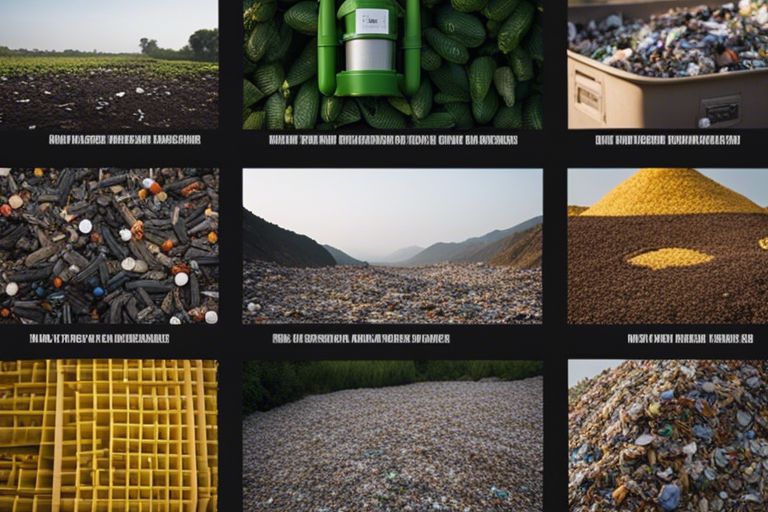Innovation plays a crucial role in tackling the pressing issue of plastic waste management in India. With the country being one of the largest consumers of plastic in the world, the need for efficient solutions has never been more urgent. Overflowing landfills, polluted water bodies, and detrimental effects on wildlife highlight the dangerous impact of plastic waste on the environment. However, there are also positive strides being made, with innovative technologies and approaches emerging to address this problem. In this blog post, we will examine into how innovative strategies can drive effective solutions for managing plastic waste in India.

Key Takeaways:
- Innovative technologies: Leveraging innovative technologies such as blockchain, AI, and IoT can help in tracking, sorting, and recycling plastic waste effectively.
- Circular economy approach: Implementing a circular economy approach can ensure that plastic waste is recycled and reused, reducing the environmental impact and conserving resources.
- Public-private partnerships: Collaborations between the government, private sector, and NGOs can drive solutions for plastic waste management by integrating expertise, resources, and funding.
Understanding Plastic Waste
There's a critical need to understand the different aspects of plastic waste to effectively manage it. From types of plastic waste to its impact on the environment and health, knowledge about plastic waste plays a pivotal role in developing sustainable solutions.
Types of Plastic Waste
Plastic waste can be categorized into various types based on their composition and usage. Understanding these types is crucial for efficient waste management. The major types of plastic waste include
- Polyethylene Terephthalate (PET)
- High-Density Polyethylene (HDPE)
- Polyvinyl Chloride (PVC)
- Low-Density Polyethylene (LDPE)
- Polystyrene (PS)
. This classification helps in proper sorting and recycling processes.
| Polyethylene Terephthalate (PET) | Used in packaging for beverages and food |
| High-Density Polyethylene (HDPE) | Commonly found in detergent bottles and milk jugs |
| Polyvinyl Chloride (PVC) | Used in pipes, window frames, and medical devices |
| Low-Density Polyethylene (LDPE) | Found in plastic bags and packaging films |
| Polystyrene (PS) | Commonly used in disposable cutlery and packaging materials |
Impact of Plastic Pollution on Environment and Health
Environment
The unchecked disposal of plastic waste has grave consequences on both the environment and human health. Plastic pollution leads to contamination of soil and water bodies, posing a threat to marine life and terrestrial ecosystems. The release of toxic chemicals from plastic waste further exacerbates the problem by polluting the air and causing respiratory issues. It is crucial to address this issue to safeguard our planet and well-being.
Innovative Approaches to Plastic Waste Management
Policy Innovations
Innovations in policy play a crucial role in driving solutions for plastic waste management in India. The government has implemented stringent regulations to control the production, usage, and disposal of plastic. Policies such as extended producer responsibility require manufacturers to take responsibility for the entire lifecycle of their products, including ensuring proper disposal. Additionally, plastic waste management rules have been enforced to promote segregation at the source, collection, and recycling of plastic waste.
Technological Innovations in Recycling and Upcycling
Innovations in technology have revolutionized the recycling and upcycling processes for plastic waste. Advanced recycling technologies such as pyrolysis and depolymerization are being adopted to convert plastic waste into valuable resources. Moreover, upcycling innovations are transforming plastic waste into new products with higher environmental value, ranging from construction materials to fashion accessories.
Policy: It is imperative to support these technological innovations with favorable policies and incentives to accelerate the transition towards a circular economy for plastic waste management in India.
Community Participation and Education
For India adopts collaborative solutions to tackle plastic waste, community participation and education play a vital role in driving solutions for plastic waste management in the country.
Role of Community in Waste Management
Management: Communities play a crucial role in waste management by actively participating in segregation, collection, and disposal activities. Their involvement not only helps in reducing the generation of plastic waste but also creates awareness about the importance of proper waste management practices.
Educating the Masses for Behavioral Change
Educating: Educating the masses about the negative impacts of plastic waste on the environment and health is imperative for bringing about behavioral change. Awareness campaigns, workshops, and educational programs can empower individuals to make responsible choices and reduce their plastic consumption.
A: These initiatives not only help in shifting societal norms towards sustainability but also foster a sense of responsibility towards the environment. By educating the masses about the long-term consequences of plastic pollution, India can inspire a collective effort towards a cleaner and greener future.
Challenges and Opportunities
Financial and Institutional Barriers
Once again, the management of plastic waste in India faces numerous challenges, including financial and institutional barriers. Many waste management facilities lack the necessary funds and resources to effectively handle the increasing amounts of plastic waste generated daily.
Potential for Scalable Solutions and Economic Growth
Opportunities exist for innovative solutions that can not only address the plastic waste crisis but also drive economic growth. An integrated approach involving the public and private sectors can lead to scalable solutions that have a positive impact on the environment and society.
For instance, initiatives like recycling plants that convert plastic waste into raw materials for manufacturing industries can create a circular economy that reduces dependence on virgin materials while generating employment opportunities.
Final Words
With these considerations in mind, it is evident that innovation holds the key to driving solutions for plastic waste management in India. By investing in research and development, promoting eco-friendly alternatives, fostering collaborations between government, industries, and communities, and implementing effective policies and regulations, India can make significant strides towards reducing its plastic waste footprint. Embracing cutting-edge technologies such as recycling, upcycling, and waste-to-energy processes can revolutionize the way plastic waste is managed in the country. It is crucial for all stakeholders to work together to support and implement innovative solutions that not only address the current plastic waste crisis but also pave the way for a sustainable and environmentally responsible future for India.
FAQ
Q: What are the challenges associated with plastic waste management in India?
A: India faces significant challenges in managing plastic waste due to inadequate infrastructure, limited awareness about recycling, and a lack of enforcement of regulations.
Q: How can innovation contribute to addressing plastic waste management in India?
A: Innovation plays a crucial role in developing sustainable solutions for plastic waste management in India. Technologies like plastic-to-fuel conversion, biodegradable plastics, and smart recycling systems can help reduce the environmental impact of plastic waste.
Q: What are some examples of successful innovations in plastic waste management in India?
A: Initiatives such as the use of plastic waste in road construction, community-based recycling programs, and the development of compostable packaging are examples of successful innovations driving solutions for plastic waste management in India.
